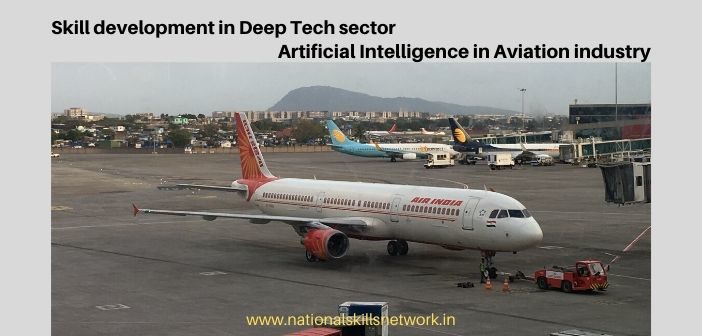Have you ever lost your baggage while traveling by air? Isn’t it a real hassle and a time consuming process to retrieve the lost baggage? Similar issues like missing connecting flights and poor in-flight service sometimes spoil an otherwise excellent flight experience.
While airline customer service representatives do their best to field every inquiry and resolve it as best they can, one technology is stepping up to help passengers befriend these frontline representatives. Yes, we are taking about Artificial Intelligence (AI) !
However, don’t confuse today’s sophisticated AI systems with chatbots, which have been around for quite some time. While chatbots can perform automated responses based on pre-set rules and formatting, AI learns over time and begins working alongside customer service representatives and other human elements.
Implementation of AI by leading airlines across the globe
Unlike other industrial revolutions, Industry 4.0 will not eradicate jobs completely as human intervention in all the tasks performed by artificial intelligence is vital during this period. Today, most of the airline brands are already beginning to realize the benefits of adopting AI technology, software, and systems alongside their human representatives. As AI, combined with the right human agents, can take customer service for airline brands to places that simply haven’t been possible before.
- Leading global airlines like Delta are coming forward and implementing AI for better customer experience. Delta Airlines took an initiative to identify passengers through AI in 2017. Their online check-in via Delta mobile app have shown promising results. Airlines are implementing AI to predict the potential failures of maintenance on aircraft.
- Leading aircraft manufacturer Airbus is taking measures to improve the reliability of aircraft maintenance by using cloud-based data storing systems.
- Indian aircraft carriers are also coming forward to implement the new age technology. Air India became the first airline in the world to use a Taxibot on A320 aircraft with passengers onboard. Taxibot is a robot-used aircraft tractor for taxiing an aircraft from parking bay to runway and vice versa.
Many airlines are implementing innovative AI solutions in service departments to engage with passengers and find effective ways to delight them. To achieve this, airline brands are focusing on upskilling and reskilling of their representatives to help them cope with the changing job role.
 How AI will modify job roles in the Aviation industry and the need for skilling
How AI will modify job roles in the Aviation industry and the need for skilling
Starting from Customer Service Representatives other job roles like ground staff, cabin crew, technicians, maintenance engineers and other staffs, everyone will see some alteration in their job roles. Existing jobs will change and new jobs will emerge. The aviation industry has a huge scope for the collaboration of human intelligence and artificial intelligence. Through this collaboration, airlines can gain more as they can enhance each other’s complementary strengths.
- New jobs that are being created as a result of Artificial Intelligence consistently requires humans and AI systems to work together, complementing and enhancing each other’s strengths.
- Skills like complex reasoning, social and emotional intelligence, creativity and certain forms of sensory perception along with mathematics and programming would become mandatory for all of us.
- AI-driven software are now smartly learning and begins working alongside humans. It is time for us to do the same.
- Learning, re-skilling and up-skilling should be the new aspiration of employees as well as airline brands.
Related article: Skill development in Deep Tech sector: AI/ML in Healthcare industry – Read more: https://nationalskillsnetwork.in/skill-development-in-deep-tech-sector-ai-ml-in-healthcare-industry/
Skill development in Artificial Intelligence for Aviation
Skill development in Artificial Intelligence for Aviation is the need of the hour. While some airlines has already partnered with institutions that can provide the required technological knowledge to their employees, the rest should upgrade themselves at the earliest. Machine learning, image recognition, object identification are the new trends. AI is the umbrella term for all of them.
- Digital platforms with hybrid learning system that are offering onsite and online experiences to seekers of deep tech expertise like AI are making it easier to choose and learn a specific technology.
- These platforms are partnering with top academic institutions and global corporations to create and deliver world class programs and certifications.
- Airline brands should partner with these digital platforms to give their employees a chance to up-skill themselves while they are still on the job.
- Taking courses, online or offline would definitely help you to get through the changes. You can choose courses as per your convenience.
- To get the benefit of AI, aviation Industries need to attract and retain highly skilled workers and allow them the time to upskill themselves even during work hours.
The future for airlines and airports is undoubtedly getting smarter. AI is starting to link everything together and providing a smart way of managing an increasingly complex ecosystem. By adapting AI as part of the aviation eco-system, airlines can minimize the impact of disruption on passenger experience, support the customers and even make their services better. As Ai is all set to make flying more secure, Directorate General of Civil Aviation (DGCA), the Indian governmental regulatory body for civil aviation, has been contributing towards implementing AI in the Indian Aviation industry. Now the most important step for the aviation industry to take is to provide its employees a platform where they can learn the required skills to welcome AI in to the ecosystem.
Author: Manjima Ghosh | Talent Sprint | For more information, please visit https://www.talentsprint.com/













Comments 1